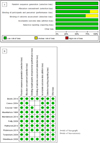Abstract
Purpose
This study was done to investigate the effects of a Stress Management Program providing Cognitive Behavior Therapy on problem-focused coping, job stress, and depression.
Methods
The research design was a quasi-experimental research with a nonequivalent control group pre-posttest. Participants were recruited from two fire safety centers in D city, and the research was carried out from March 11 to April 2, 2011. To test the effects of the Stress Management Program participants were divided into two groups, an experimental group (21) and a control group (20). The research tools included problem-focused coping, job stress, and depression scales. The Stress Management Program was provided to the experiment group for 60 minutes/session twice a week, for 4 weeks. Data were analyzed using Fisher's exact probability test, χ2-test, t-test with the SPSS/WIN 14.0 program.
Results
After attending the Stress Management Program, significant differences were found in problem-focused coping scores and depression scores between the experimental group and the control group (t=4.70, p<.001; t=-3.16, p=.003). But there were no significant differences in job stress scores between the two groups.
Figures and Tables
Table 2
Homogeneity of General and Professional Characteristics between Experimental and Control Group in Pre-test (N=41)

References
1. Choi SA. Effects of cognitive restructuring group counseling program on reducing stress of university students. Korean J Christ Couns. 2003. 14:261–288.
2. Choi SK, Lee KS, Lee SY, Yu JH, Hong AR, Chae SJ, et al. The effectiveness of an intervention program for subway operators for symptoms of post-traumatic stress disorder after the person had fallen under a train. Korean J Occup Environ Med. 2010. 22:29–36.

3. Derogatis LR, Rickels K, Rock AF. The SCL-90 and the MMPI: A step in the validation of a new self-report scale. Br J Psychiatry. 1976. 128:280–289.

4. Kwon SC, Song J, Lee SJ, Kim I, Koh J, Ryou H, et al. Post-traumatic stress disorder of a fire department firefighter and related factors. Korean J Occup Environ Med. 2008. 20(3):193–204.
5. Hyun SH, Kim YW, Choi HC. An empirical analysis on the firefighters' recognition about risk induction factors. J Korean Inst Fire Sci Eng. 2010. 24(6):160–169.
6. Kang BW. A study on the relationship between job stress and socio-psychological stress of firefighter. J Korean Soc Emerg Med Technol. 2009. 13:35–48.
7. Kang HJ. Comparison of stress and coping strategies of stress among athletic students and general students. 2006. Jeonju: Jeonju University;Unpublished master's thesis.
8. Kim GI, Won HT, Lee JH, Kim GY. Standardization study of symptom check list-90 in Korea. J Korean Neuropsychiatr Assoc. 1978. 17:449–458.
9. Kim HS. The effects of group psychiatric nursing care program applied MBTI on depression, interpersonal relationships, and situational confidence of alcoholics. 2004. Daegu: Kyungpook National University;Unpublished doctoral dissertation.
10. Kim JH. Relations of perceived stress, cognitive set, and coping behaviors to depression. 1987. Seoul: Seoul National University;Unpublished doctoral dissertation.
11. Kim JH. A meta-analysis of effects of job stress management interventions. J Korean Acad Nurs. 2007. 37:529–539.

12. Kim JH, Moon TY, Park JH, Uhm TH, Choi HK. Post traumatic stress disorder in disaster and emergency. Proceeding of Korean Institute of Fire Science & Engineering Conference. 2010. (11):398–403.
13. Kim SK. A study on job stress of firefighters. -Subordinate job stress of firefighters around the excavation of precipitating factors. 2002. Seoul: Dankook University;Unpublished doctoral dissertation.
14. Kim SK. Early detection of fire officials from post-traumatic stress disorder treatment. The Kyeonggi Ilbo. 2010. 07. 15.
15. Kubiak LC. A school-based, stress-inoculation approach to stress management training with adolescent: Effects on locus of control, self-concept, state-trait anxiety and social behavior. 1987. USA: University of Florida;Unpublished doctoral dissertation.
16. Lazarus RS, Folkman S. Stress, appraisal and coping. 1984. New York: Springer.
17. Lee HJ. The factors affecting firefighters mental health. 2011. Daegu: Kyungpook National University;Unpublished master's thesis.
18. Lee HJ, Kim HS, Park SY. Effects of perception of job stress and stress coping style on mental health of firefighters. J Korean Acad Psychiatr Ment Health Nurs. 2011. 20:315–324.

19. Mitchell JT, Everly GS. Critical Incident Stress Debriefing (CISD): An operations manual for the prevention of traumatic stress among emergency services and disaster workers. 1996. 2nd ed. Ellicott City, MD: Chevron Publishing.
20. National Emergency Management Agency. The provision for safety supervision of the fire services act. 2010. Retrieved April 30, 2010. from http://www.nema.go.kr.
21. National Emergency Management Agency. The provision for safety supervision of the fire services act. 2011. Retrieved June 15, 2011. from http://www.nema.go.kr.
22. Noh CH. Daily life stress and coping strategies of chronic mentally ill in vocational rehabilitation program. J Korean Acad Psychiatr Ment Health Nurs. 2001. 10:508–520.
23. Park KA. A research study on the effects of REBT based group career counseling on college students' career development. Korean J Couns Psychother. 2002. 14(2):339–358.
24. Parker DF, Decotiis TA. Occupational determinants of job stress. Organ Behav Hum Perform. 1983. 32:160–177.
25. Sin JT, Kim RB. The analysis on the effects of stress coping program for female players of university. Korean J Sport Sci. 2007. 18:111–119.

26. Yang SH. The effects of stress management program on depression, anxiety, and self-esteem for the children of alcoholics. J Korean Acad Psychiatr Ment Health Nurs. 2005. 14:203–211.
27. Yu JH. The relations of PTSD symptoms, emotional states, coping style and social support in urban fire fighters. 2006. Seoul: The Catholic University of Korea;Unpublished master's thesis.




 PDF
PDF ePub
ePub Citation
Citation Print
Print





 XML Download
XML Download